Heart of fire
San Francisco - I stood by Lake Oroville, looking at the bridge. The night sky was orange, lighting the distant tree tops. The hillside was dotted with fire and reflected on the water. I snapped a picture. The road over the Bidwell Bar Bridge seemed to run straight into the heart of the flames.
My passion is covering natural disasters. Fires, tornadoes and volcanoes. I like being able to show what happens on this planet. In ten years covering wildfires in California, I've never seen anything like what this year brought. The new normal now seems to be that every fire season brings a new surprise.
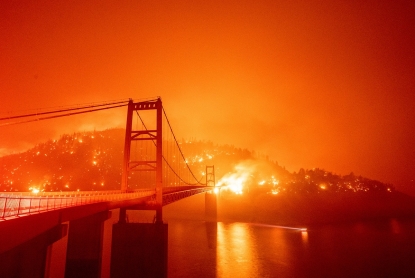 A boat motors by as the Bidwell Bar Bridge is surrounded by fire in Lake Oroville during the Bear fire in Oroville, California on September 9, 2020. (AFP / Josh Edelson)
A boat motors by as the Bidwell Bar Bridge is surrounded by fire in Lake Oroville during the Bear fire in Oroville, California on September 9, 2020. (AFP / Josh Edelson)We had just had our worst heatwave ever. In my city, near San Francisco, California, it reached 43 degrees Celsius (111 Fahrenheit). Los Angeles hit 117 Fahrenheit. One night in San Francisco it stayed at 98 all night. Strong winds started blowing. The land around was extremely dry. Then a rare storm system brought one of the most intense electrical storms ever recorded for the San Francisco Bay area. Some 2,500 lightning strikes, no rain. They call this dry lightning. It was an extraordinary climate event for northern California. We get lightning in the Bay Area maybe once a year. Every couple of years, a couple of bolts. All of a sudden, there were fires everywhere.
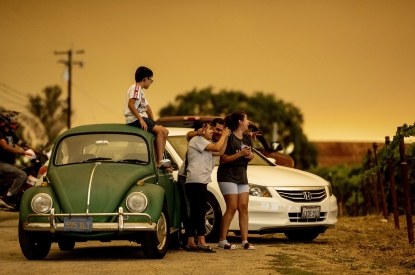 People watch a smoke plume from a fire in Healdsburg, California on August 20, 2020. (AFP / Josh Edelson)
People watch a smoke plume from a fire in Healdsburg, California on August 20, 2020. (AFP / Josh Edelson)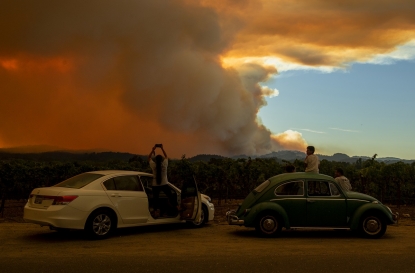 People watch a fire from a vineyard in Healdsburg, California on August 20, 2020. (AFP / Josh Edelson)
People watch a fire from a vineyard in Healdsburg, California on August 20, 2020. (AFP / Josh Edelson)
But the worst came in September. I'm writing this after a straight 36-hour shift with no breaks. I first covered the Creek fire, in the Sierra National Park, then drove 5.5 hours north to intercept the Bear fire, just as it was raging through the Berry Creek area. I shot all night, and all the next day. There was a lot more to shoot, but at that point I was so exhausted, I didn't trust myself to make smart decisions anymore so I had to disengage. Meanwhile, my colleagues to the north in Oregon and Washington state were working hard also to cover many of the fires up there, although access is much more difficult.
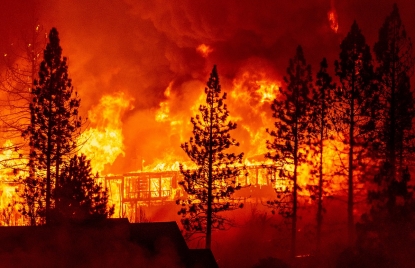 The Creek Fire destroyed countless homes like this one in Fresno County, California (AFP / Josh Edelson) (AFP / Josh Edelson)
The Creek Fire destroyed countless homes like this one in Fresno County, California (AFP / Josh Edelson) (AFP / Josh Edelson)The Creek Fire, did things that none of us had ever seen before. It's in the Sierra Nevada mountains, south of San Francisco. In normal times, you can fish there or waterski. It's a vast range of national parks, covered in ancient forest, waterfalls and granite cliffs. There are huge Sequoia trees. Some of them are thousands of years old and hundreds of feet high.
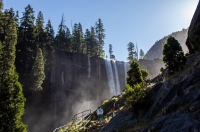
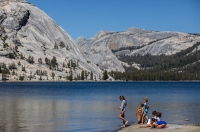
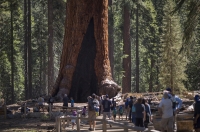
The day I went to that fire, it had covered 5,000 acres by 5:00pm. At 6:00pm it was 36,000 acres. We asked ourselves, how is this possible? And then by 11:30pm it was over 100,000 acres and we were like, is this a mistake? This would be an unprecendented rate of spread.
It turned out that this area was full of dead gigantic, hundred-foot tall trees. With trees this tall, the flames can be at least double the height of the tree. The pyrocumulonimbus ash plume climbed to 50,000 feet, as high as supercell storm systems in the plains of the US that generate tornadoes.
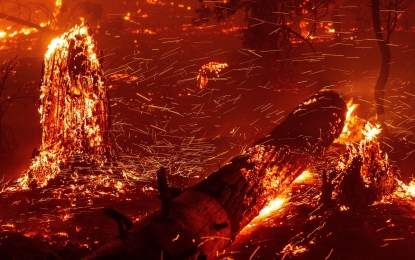 The Creek Fire destroyed countless homes like this one in Fresno County, California (AFP / Josh Edelson)
The Creek Fire destroyed countless homes like this one in Fresno County, California (AFP / Josh Edelson)And this one did too. It generated its own lightning, which started new fires and multiple fire tornadoes that spread embers causing even more spot fires. It looked like an atomic bomb blew up.
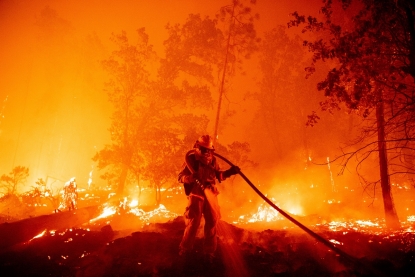 California firefighters have been stretched while battling the California fires
(AFP / Josh Edelson)
California firefighters have been stretched while battling the California fires
(AFP / Josh Edelson)I saw flames hundreds of feet high, like a wall of fire. It was really scary - especially since there were very few firefighters in the area. Their crews were spread thin because of how many fires there were, and also because of Covid-19.
In the Berry Creek area - north of Lake Oroville - there was one they called the Bear Fire. I saw the flames leaping from one forty-metre treetop to another.
Berry Creek used to be a pretty country village. It's been completely destroyed, including multiple schools, a town store, a fire station and hundreds of homes.
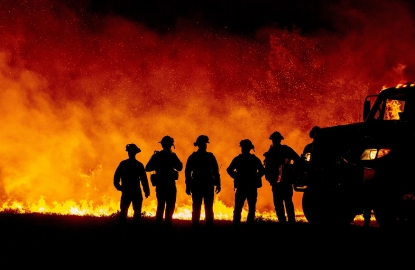 Some of the blazes looked like a "wall of fire" (AFP / Josh Edelson)
Some of the blazes looked like a "wall of fire" (AFP / Josh Edelson)My wife makes me promise her, before I go to cover any fire, to only take calculated risks. Before I go in, I need to make sure that I have an exit route. If I see flames, I need to make sure that I have a defensive space in mind that I can retreat to for safety before going to take pictures.
It can be very tempting to see big flames and to just run in to get the pictures without thinking, but it is easy to get trapped since the fire moves very quickly. The fire spreads faster than you can run away from it. Yes, it is getting more dangerous, but it is also getting more fascinating.
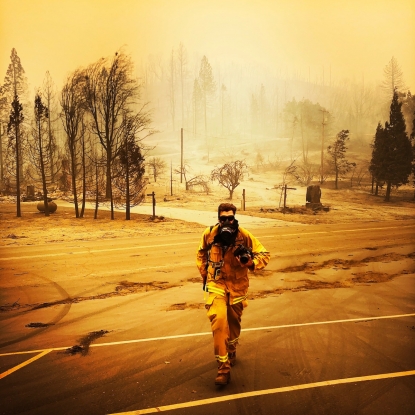 Josh Edelson, covering the Creek Fire (Noah Berger)
Josh Edelson, covering the Creek Fire (Noah Berger)I am transfixed and fascinated and passionate and also humbled by the power of these events and super-driven to continue telling these stories so people can see what's going on inside the fire line.
Hundreds of thousands of people have fled their homes. They say a million hectares of land have been burnt. That's the size of New Jersey. And the fire season hasn't even hit its peak yet.
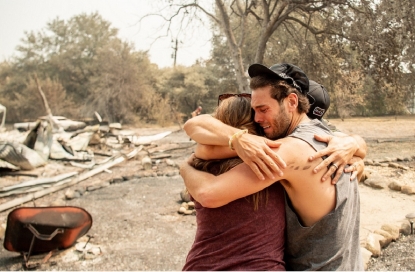 Many people have lost their homes, like this family in Vacaville, California (AFP / Josh Edelson)
Many people have lost their homes, like this family in Vacaville, California (AFP / Josh Edelson)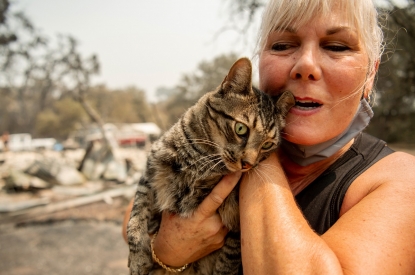 Katie Giannuzzi lost her home but her cat survived (AFP / Josh Edelson) (AFP / Josh Edelson)
Katie Giannuzzi lost her home but her cat survived (AFP / Josh Edelson) (AFP / Josh Edelson)You think you know how fires behave -- at least in California. And then the next year it's like: “I’ve never seen this before.” Every time the firefighters say: “This is unprecedented.” Now, that phrase seems to be the new normal.
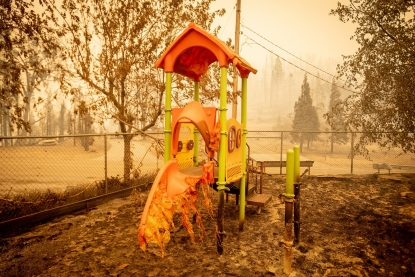 A melted slide smolders as a playground continues to burn at Pine Ridge school during the Creek fire (AFP / Josh Edelson)
A melted slide smolders as a playground continues to burn at Pine Ridge school during the Creek fire (AFP / Josh Edelson)Some of my pictures went viral. The New York Times shared one, Hillary Clinton as well. Even president Donald Trump shared one. I was thinking, how can I leverage this? My wife and I were brainstorming about it. Maybe we can sell a print and make it so 100 percent of the proceeds went to victims of the wildfires and firefighters' funds.
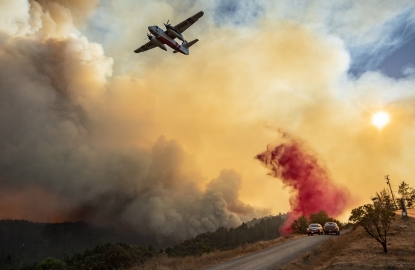 (AFP / Josh Edelson)
(AFP / Josh Edelson)I'm passionate about covering these things for general news purposes, but If I could also find a way to make it so that my pictures make a positive difference somehow, that would make me feel like my purpose here has been fulfilled.
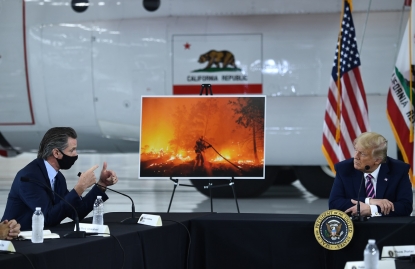 One of Edelson's photos made an appearance at a meeting between US President Donald Trump and California Governor Gavin Newsom on September 14, 2020 during a briefing on wildfires. (AFP / Brendan Smialowski)
One of Edelson's photos made an appearance at a meeting between US President Donald Trump and California Governor Gavin Newsom on September 14, 2020 during a briefing on wildfires. (AFP / Brendan Smialowski)This blog was edited by Roland Lloyd Parry and Michaëla Cancela-Kieffer in Paris






